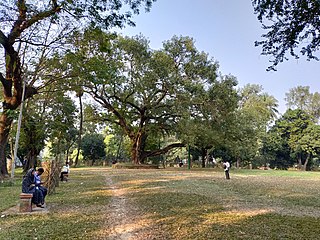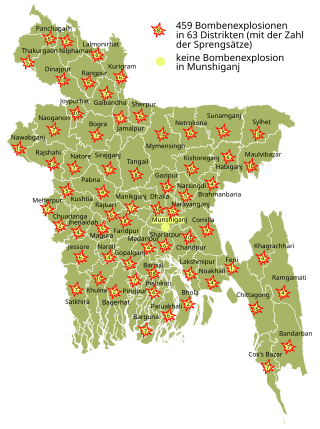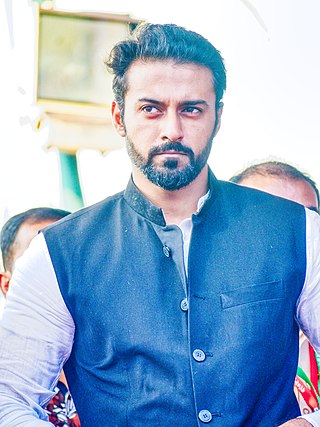Related Research Articles

Politics of Bangladesh takes place in a framework of a parliamentary representative democratic republic, whereby the Prime Minister of Bangladesh is the head of government, and of a multi-party system. Executive power is exercised by the government. Legislative power is vested in both the government and parliament. The Constitution of Bangladesh was written in 1972 and has undergone seventeen amendments.

The Bangladesh Nationalist Party is a conservative, centre-right political party in Bangladesh, one of the major political parties in the nation. It was founded on 1 September 1978 by the late Bangladeshi president Ziaur Rahman, after the presidential election of 1978, with a view of uniting people with a nationalist ideology. Following Rahman's assassination in 1981, his widow, Khaleda Zia, took over leadership of the party and presided as chairperson until her imprisonment, in 2018. Since then, Tarique Rahman, the son of Rahman and Zia, has served as acting chairperson and has run the affairs of the party from London.

Abdul Kader Siddique is a Bangladeshi politician. He served as a Mukti Bahini member and organizer of the Bangladesh Liberation War. He fought with an estimated 17,000-strong guerrilla force in the Tangail region against the Pakistan Army. The army was called Kaderia Bahini. At the end of the war, in1971, Siddique's forces entered Dhaka along with the Indian forces, signaling the end of the war. He was awarded Bir Uttom by the Government of Bangladesh. Since 1999, he has been serving as the leader of his newly formed party, the Krishak Sramik Janata League.
2001 (MMI) was a common year starting on Monday of the Gregorian calendar, the 2001st year of the Common Era (CE) and Anno Domini (AD) designations, the 1st year of the 3rd millennium and the 21st century, and the 2nd year of the 2000s decade.
The 21 August 2004 Dhaka grenade attack took place at an anti-terrorism rally organised by Awami League on Bangabandhu Avenue on 21 August 2004. The attack left 24 dead and more than 500 injured. The attack was carried out at 5:22 pm after Sheikh Hasina, the leader of opposition had finished addressing a crowd of 20,000 people from the back of a truck. The attacks targeted Awami League president Sheikh Hasina. Hasina was injured in the attack.The involvement of BNP-Jamaat led government is still debated to this date.

Lutfuzzaman Babar is a Bangladeshi politician who served as the Bangladeshi State Minister of Home Affairs in the Khaleda Zia Cabinet, as a member of the Bangladesh Nationalist Party. He is currently in prison for the death penalties in two cases – in January 2014 on charges of 2004 arms smuggling in Chittagong and in October 2018 for killing through criminal conspiracy at the 2004 Dhaka grenade attack.

The Ramna Batamul bombing was a series of bomb attacks on 14 April 2001 at a cultural programme of the Pahela Baishakh celebrations arranged by Chaayanot, the leading cultural organization of Bangladesh.
The Bangladesh Freedom Party is a party founded by Captain Khandaker Abdur Rashid, Colonel Syed Faruque Rahman and Major Bazlul Huda, the chief conspirators of the killing of Sheikh Mujibur Rahman on 15 August 1975.

Bangladesh has experienced terrorism in the past conducted by a number of different organizations. In the past, both ISIL and other terrorist organizations had claimed to be active in the country however, the Bangladeshi government believes that they mainly operated through local affiliates, before being neutralised by security forces.
On 3 June 2001, during Sunday mass, a bomb exploded at the Most Holy Redeemer Church in the parish of Baniarchor in Gopalganj District, Bangladesh. The bombing killed 10 people and injured 26 people.
Mufti Abdul Hannan was a Bangladeshi terrorist and the chief of Harkat-ul-Jihad al-Islami Bangladesh. He was sentenced to death by hanging for multiple crimes and executed on 12 April 2017.
2001 bombing on Communist Party of Bangladesh was a terrorist grenade attack on a rally of the Communist Party of Bangladesh in Paltan Maidan, Dhaka, Bangladesh. Five people were killed in the attack and dozens were injured. The Communist Party of Bangladesh observes 20 January as the "Paltan Killing Day".
Sheikh Helal Uddin is a Bangladesh Awami League politician and member of parliament from Bagerhat-1.
The 2001 Narayanganj bombing was a bomb attack on 16 June 2001 at a meeting of Bangladesh Awami League in Narayanganj, Bangladesh that resulted in the death of 22 people. The reason cited by investigators for the attack is that the local member of Parliament had banned senior leaders of the Islamist party Jamaat-e-Islami Bangladesh. Harkat-ul-Jihad al-Islami, who were patronized by Jammat, decided to attack Shamim Osman, the local member of parliament, who attending the meeting.
Harkat-ul-Jihad-al-Islami Bangladesh, [transl. Jihad movement of Islam of Bangladesh] is the Bangladeshi branch of the terrorist group Harkat-ul-Jihad-al-Islami (HuJI). It is banned in Bangladesh and is a Proscribed Organisation in the United Kingdom under the Terrorism Act 2000.

The 15 August 1975 Bangladesh coup d'état was a military coup launched by mid ranking army officers in Bangladesh on 15 August 1975. The officers were part of a conspiracy to assassinate Sheikh Mujibur Rahman, the Founding Father of Bangladesh, who led the independence struggle during the Bangladesh Liberation War and later served as the first and fourth President and later in between his two presidential terms served as the second Prime Minister of Bangladesh from April 1971 until his assassination in August 1975. Sheikh Mujibur Rahman and most of his family members were killed during the coup, with the exception of his two daughters Sheikh Hasina and Sheikh Rehana.
The 2001 Sunamganj bombing was a bomb attack on 26 September 2001 at a meeting of Bangladesh Awami League in Sullah Upazila, Sunamganj, Bangladesh that resulted in the death of 4 people.
Bagerhat-1 is a constituency represented in the Jatiya Sangsad of Bangladesh since 2009 by Sheikh Helal Uddin of the Awami League.

Sheikh Sharhan Naser Tonmoy best known as Sheikh Tonmoy is a Bangladesh Awami League politician and the incumbent member of parliament from Bagerhat-2. He is a grand-nephew of Sheikh Mujibur Rahman and nephew of Sheikh Hasina.
Attempted assassination of Sheikh Hasina refers to the attempted assassination of Sheikh Hasina, Prime Minister of Bangladesh, by Harkat-ul-Jihad-al-Islami Bangladesh on 21 July 2000 in Gopalganj District. The authorities found the explosives beforehand and thwarted the assassination attempt.
References
- ↑ Riaz, Ali (2008). Islamist Militancy in Bangladesh: A Complex Web. Routledge. p. 114. ISBN 978-0-415-45172-7 . Retrieved 1 August 2017.
- ↑ "Bangladesh rally bombed". BBC News. Retrieved 1 August 2017.
- ↑ "Mufti Hannan remanded in Bagerhat bomb attack case". The Daily Star. 23 August 2010. Retrieved 1 August 2017.
- ↑ Chowdhury, Rashed (24 September 2001). "Eight die in Bangladesh election rally bomb blast". Gulf News. Retrieved 1 August 2017.
- ↑ "Case for bombing Sk Helal's public meet revived". The Daily Star. 7 February 2010. Retrieved 1 August 2017.
- ↑ "Charges pressed against 4 over bomb attack on Helal's rally". Prothom Alo. Archived from the original on 2 August 2017. Retrieved 1 August 2017.
- ↑ "Mufti Hannan, 5 others charge sheeted". The Daily Star. 22 August 2013. Retrieved 1 August 2017.
- ↑ "Charges pressed against 4". The Financial Express. Archived from the original on 2 August 2017. Retrieved 1 August 2017.
22°55′31″N89°48′13″E / 22.9254°N 89.8035°E